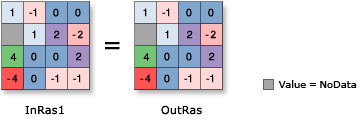Available with Spatial Analyst license.
Summary
Multiplies each cell value of the input raster on a cell-by-cell basis by 1.
Illustration

Discussion
When using an operator with a raster input the result will be a raster. However, if all inputs are numbers, then the result is a number.
When multiple operators are used in an expression, they are not necessarily executed in left-to-right order. The operator with the highest precedence value will be executed first. For more information on operator precedence, see operator precedence table. You can use parentheses to control the execution order.
If the input is integer, the output will contain integer values; if the input is floating point, the output will contain floating-point values.
Syntax
+ in_raster_or_constant
| Operand | Explanation | Data Type |
in_raster_or_constant | The input raster to apply the Unary Plus operator (multiply by 1). | Raster Layer | Constant |
Return Value
| Name | Explanation | Data Type |
| out_raster | The output raster object. The cell values are the input values multiplied by 1. | Raster |
Code Sample
Unary + (Unary Plus) example 1 (Python window)
This sample applies the Unary Plus operator to the input raster.
import arcpy
from arcpy import env
from arcpy.sa import *
env.workspace = "C:/sapyexamples/data"
outUnaryPlus = + Raster("degs")
outUnaryPlus.save("C:/sapyexamples/output/outdeg")
Unary + (Unary Plus) example 2 (stand-alone script)
This sample applies the Unary Plus operator to the input raster.
# Name: Op_UnaryPlus_Ex_02.py
# Description: Returns the cell valuesof the input raster on a cell-by-cell
# basis.
# Requirements: Spatial Analyst Extension
# Import system modules
import arcpy
from arcpy import env
from arcpy.sa import *
# Set environment settings
env.workspace = "C:/sapyexamples/data"
# Set local variables
inRaster = Raster("degs")
# Check out the ArcGIS Spatial Analyst extension license
arcpy.CheckOutExtension("Spatial")
# Execute Negate
outUnaryPlus = +(inRaster)
# Save the output
outUnaryPlus.save("C:/sapyexamples/output/outunplus")